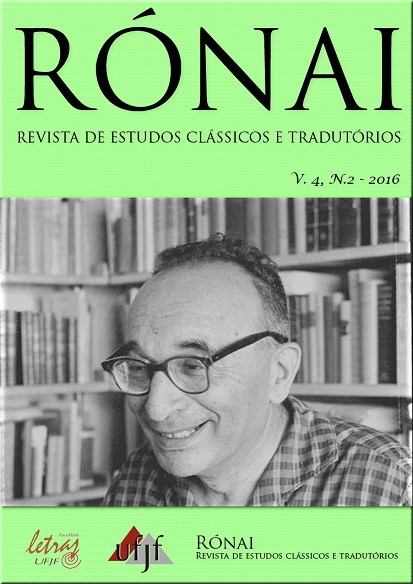Ariadne a Teseu: um estudo da persuasão na Carta X das Heroides, de Ovídio
Palavras-chave:
Latim, Heroides, PersuasãoResumo
Este artigo apresenta discussões proporcionadas por um trabalho que propõe abordar os textos latinos clássicos a partir do instrumental teórico fornecido pela Linguística, pela Semiótica e pela Retórica moderna. O objetivo é estudar como se constrói, no arranjo formal da linguagem, a persuasão na Carta X, das Heroides, de Ovídio. Discute-se, a partir de exemplos do texto original, de que maneira o uso de recursos expressivos (como marcas enunciativas, figuras de retórica e construções sintáticas) proporciona a produção de efeitos de sentido que contribuem para a persuasão.
Downloads
Referências
FARIA, Ernesto. Dicionário latino-português. Belo Horizonte, Rio de Janeiro: Garnier, 2003.
FIORIN, José Luiz. Figuras de Retórica. São Paulo: Contexto, 2014.
___________.Elementos de análise do discurso. 13a ed. São Paulo: Contexto, 2011.
___________. Astúcias da enunciação. São Paulo: Ática, 2001.
LIMA, Alceu Dias. Uma estranha língua?: questões de linguagem e de método. São Paulo: Edunesp, 1995.
LONGO, Giovanna. Ensino de Latim: reflexão e método. Araraquara, 2011. 248f. Tese (Doutorado em Linguística e Língua Portuguesa). Faculdade de Ciências e Letras, Universidade Estadual Paulista, Araraquara, 2011.
OVIDE. Héroïdes. Texte établi par H. Bornecque et traduit par M. Prévost. 5e édition revue et corrigée et augmentée par Danielle Porte. Paris: Les Belles Lettres, 2005.
Downloads
Arquivos adicionais
Publicado
Como Citar
Edição
Seção
Licença
Copyright (c) 2017 Beatriz Torres, Giovanna Longo

Este trabalho está licenciado sob uma licença Creative Commons Attribution 4.0 International License.
Direitos Autorais
Autores que publicam nesta revista concordam com os seguintes termos:
1. Autores e autoras mantém os direitos autorais e concedem à revista o direito de primeira publicação, sendo a publicação licenciada sob a Creative Commons Attribution License 4.0 Internacional.
2. Os autores e autoras têm permissão e são estimulados(as) a publicar e compartilhar o trabalho com reconhecimento da publicação inicial nesta revista.
3. Os autores e autoras dos trabalhos aprovados autorizam a revista a ceder o conteúdo de seus trabalhos, após sua publicação, para reprodução em indexadores de conteúdo, bibliotecas virtuais e similares.
Para mais informações sobre a Creative Commons Attribution 4.0 International License, acessar: https://creativecommons.org/licenses/by/4.0/
Isenção editorial
O conteúdo dos artigos publicados é de inteira e exclusiva responsabilidade de seus autores, não representando a posição oficial da Rónai - Revista de Estudos Clássicos e Literários ou do Faculdade de Letras da Universidade Federal de Juiz de Fora ou das instituições parceiras.



